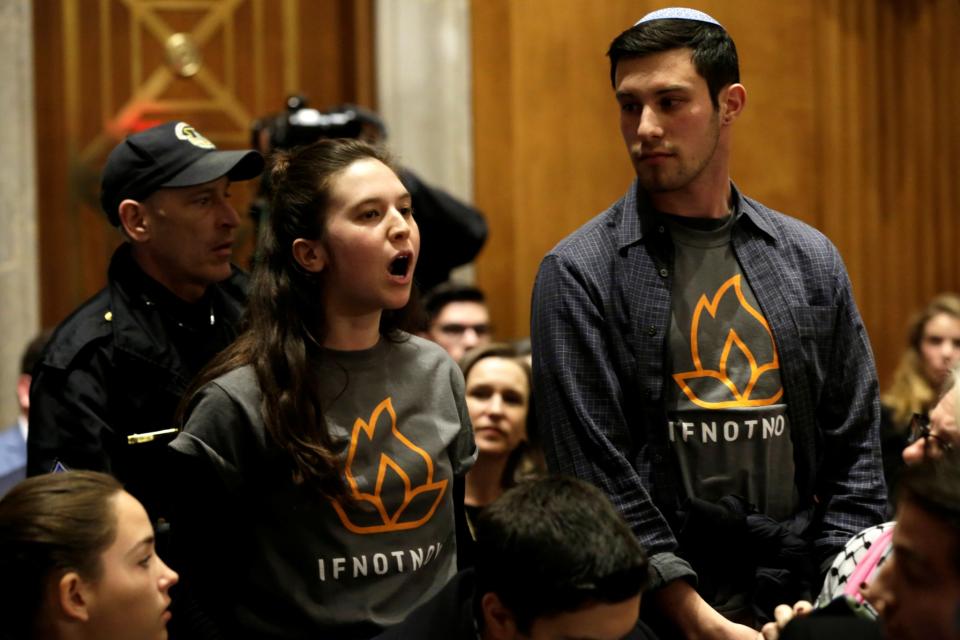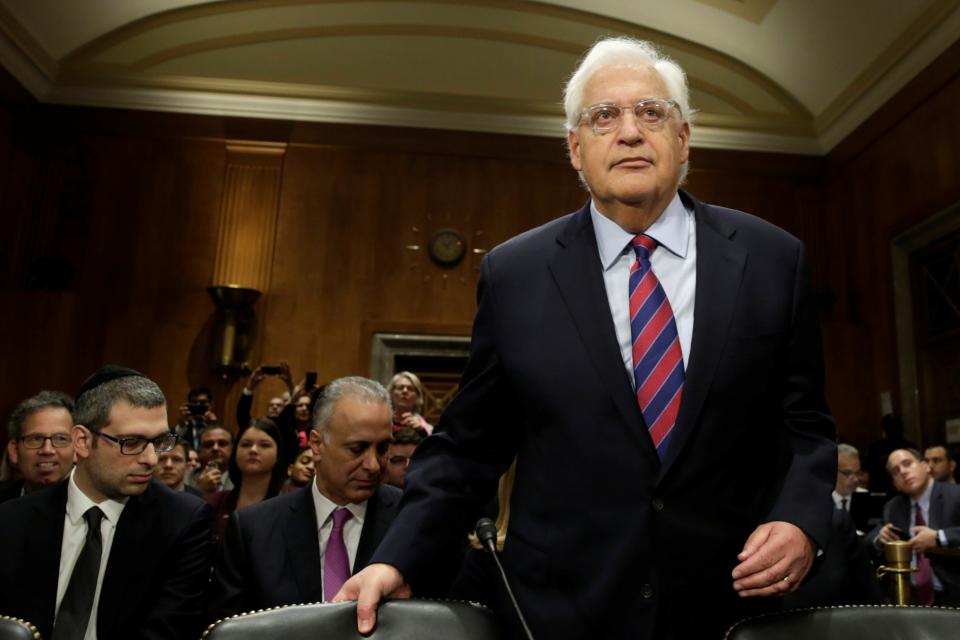A new generation of activists takes aim at Trump’s pick for ambassador to Israel

JERUSALEM — Taher Herzallah, a Palestinian-American, rose from a chair at a Senate Foreign Relations Committee hearing for a potential ambassador to Israel. Holding a Palestinian flag, he shouted, “Mr. Friedman said that Palestinian refugees don’t have a claim to the land.”
He was speaking of the land now controlled by Israel and addressing President Trump’s pick for ambassador. Herzallah, 28, is part of a generation of young activists whose opposition to the military occupation and what they consider Israel’s human rights violations has crystallized around the nomination of David Friedman, a Jewish American bankruptcy lawyer. The committee is expected to vote on his confirmation next week.
Friedman supports Trump’s intention to move the U.S. Embassy from Tel Aviv to Jerusalem, which Palestinians regard as a provocation. And he has given significant financial support to Israel’s expanding settlements in the occupied West Bank. The settlements are considered illegal under international law and illegitimate under long-standing U.S. policy, which under previous presidents has been to support a separate Palestinian state. But Trump’s statements appear to undermine that commitment.
Yahoo News spoke to Herzallah, an outreach director with American Muslims for Palestine. He said, “As an American citizen who pays my taxes, I don’t want to see U.S. policy shift towards normalizing settlements. The Senate and those who are in Congress [should] recognize there’s clearly a generational divide with regards to opinions about Israel-Palestine.”
At the hearing, Herzallah continued, “I’m right here. My grandfather was exiled, kicked out by the state of Israel. We are not going away.”
His family, originally from Gaza, moved to the Negev Desert area in the 1930s and by his account was expelled from its home after Israel became a state in 1948. Though he grew up in the U.S., he has traveled to Gaza and feels a connection to the politics of the region.
But he believes U.S. congressional leaders do not understand where their own constituents stand on Israeli-Palestinian matters. “Sitting there and listening to the Senate Foreign Relations Committee pontificating on their love for Israel,” he said, “really demonstrated to me how out of touch they were with the emerging reality.”
Herzallah wasn’t the only protester at Friedman’s hearing. Young Jewish Americans from an organization called If Not Now also protested at the hearing and accused Friedman of racism, saying, “You do not represent us.”

One of the protesters, Isaac Flegel-Mishlove, 24, an organizer with If Not Now, told Yahoo News, “David Friedman represents a total moral failure of the Jewish establishment.” He said Friedman’s views are “a violation of core Jewish principles.”
He believes he was raised to practice “radical love, loving the neighbor, loving the stranger,” and when it comes to Israeli occupation, “those fundamental principles, those Jewish values” are not applied. He calls for an end to Israeli military occupation, which he says is a “system of violence and separation.”
He believes Friedman’s ambassadorship in coordination with U.S. policy could be damaging to peace and could “induce serious violence against Palestinians and Israelis.”
The six protesters at the hearing were then taken away by police. Herzallah and Flegel-Mishlove said they were taken to a police station, held for six hours, charged and released. While Flegel-Mishlove was offered “post and forfeit” — meaning he could pay a fine for a charge of “unlawful demonstration” and close his case — Herzallah was not offered the same. He will have to appear in court on March 1 and is charged with “unlawful disruption of Congress.”
On the ground, in Jerusalem, a nongovernmental Israeli-based organization, B’Tselem, works to educate the international community about human rights abuses against Palestinians in the occupied West Bank, covering everything from the Israeli military raiding homes to demolitions that make room for more settlers.
B’Tselem’s spokesperson, Amit Gilutz, told Yahoo News that Israeli policy has been designed over the years to make military occupation a permanent force: “Israel’s policy is to control as much land as possible with as few Palestinians on it as possible.”
Gilutz said Israeli policy is taking away people’s livelihood and that Palestinians actually live on about “165 islands of land or enclaves that cannot thrive. They’re disconnected from one another, and they lack resources that are needed for future development.”
The organization wants the global community to apply pressure on the Israeli government and demand that human rights be observed, because, Gilutz said, “we think the power disparity — between the Israelis and Palestinians — is so huge that Israel doesn’t really have a reason to change course.”

The Israeli government recently approved more than 3,000 new housing units for Jews on the West Bank. Trump has called for a pause in new construction in the settlements, believing further building could obstruct peace negotiations.
Diana Buttu, a former negotiations lawyer for Palestinian officials and a political analyst, sat down with Yahoo News in Jerusalem. She said Israel and the United States see Palestinians as a “problem” that needs to be solved. “This is a [U.S.] president who does not understand the basics of international law. Settlements are illegal. They’re not just illegal; they’re war crimes. The problem is, at its core, is Israel continues to defy international law and nobody wants to hold them to task.”
She said she supports “boycotts, divestments and sanctions on Israel, because until they see there’s a price to be paid for violating international law, they’re going to continue to make excuses. And they’re going to continue to build and expand more settlements.”
Meanwhile, Israeli settlement leaders are pressing for the U.S. and Israeli Prime Minister Benjamin Netanyahu to support the annexation of the occupied West Bank. The Beit El settlement has received sizable financial donations from both Trump and Friedman over the years. Its spokesman, Hagai Ben Artzi, told Yahoo News, “We expect the new [U.S.] administration to support the development and growth of settlements.”
He denies that Palestinians are under military administration and says they have no claim to the land. “An independent state will be a disaster for Israel … because it will be something like Gaza. Instead of peace, we got a terror state in Gaza,” he said, adding that Palestinians should build alongside the settlers, but “only under the umbrella of Israeli sovereignty.”
At the Trump-Netanyahu press conference last week, the Israeli prime minister seemed to echo Ben Artzi’s belief. “Jews are called Jews because they come from Judea,” he said. “This is our ancestral homeland. Jews are not foreign colonialists in Judea.”
Friedman, too, testified he would be “delighted to see peace” come to the region, but he said he was skeptical of a two-state solution because he has seen an “unwillingness on the part of the Palestinians to renounce terror.”
Yahoo News sought a comment from Netanyahu’s office on how the Israelis plan to move forward after the meeting with Trump, but received no response.
Buttu, however, said Israelis are colonizing Palestinians. “Every colonial movement in history has had to justify their colonial activities — by either saying that the people who they’re over are insufficient to rule themselves, or that they weren’t really a people to begin with. Israel has used a combination of the two.”

She also believes Friedman’s remarks about Jewish Americans who stood against Israeli occupation — he called them “kapos,” a term for Jews who helped Nazis in exchange for special favors — are “statements deep down he believes in.” Now, she said, “the mask is off, and it’s clear exactly where the United States’ position is” on Israeli-Palestinian peace.
Buttu said she was impressed by how many Jewish organizations have come out against Friedman’s nomination. But many Palestinians are skeptical of a change in American policy.
Herzallah said one of the messages he hoped to get out to fellow Palestinians during his protest was that “Palestinians living in what we call shatat, or exile, or in diaspora … are truly engaged in this issue, that we care and we’ll do whatever it takes to change U.S. foreign policy.”
Flegel-Mishlove said, “I think there’s a lot of work done to get young American Jews feeling uncomfortable, getting out on the streets, writing on Facebook, writing to elected officials, making their voice heard in Jewish institutions. If Not Now is having enormous success — our numbers are growing.”
_____
Ash Gallagher is a journalist covering the Mideast for Yahoo News.
Read more from Yahoo News:


